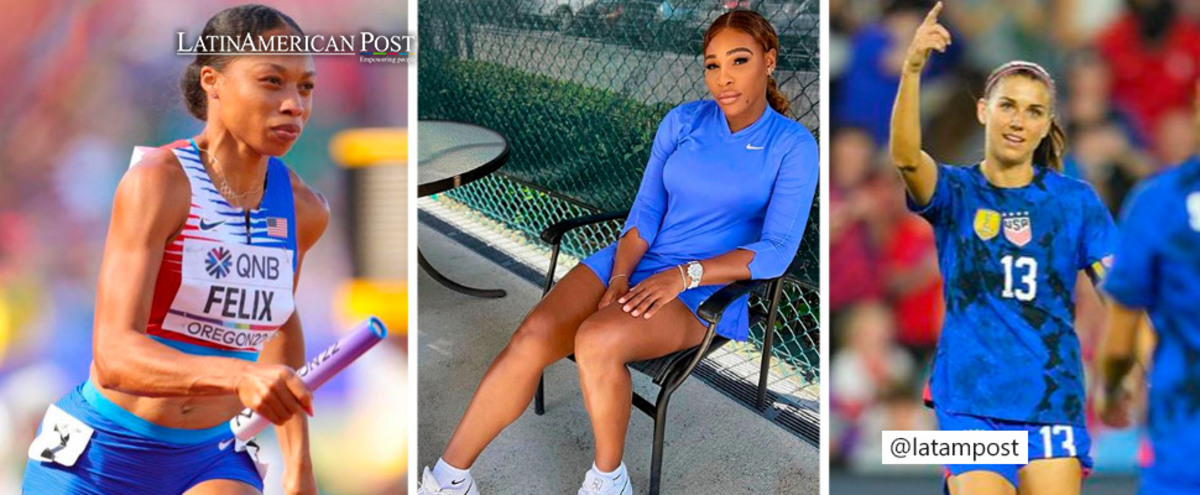Right to Maternity in Sports: How Does it Work at FIFA?
Maternity in elite athletes was classified as a problem. However, over the years this has evolved. We tell you about the new initiatives to solve this situation.

Photos: IG-allysonfelix, IG-serenawilliams, IG-alexmorgan13
LatinAmerican Post | Daniel González Guerrero
Listen to this article
Leer en español: Derecho a la maternidad en los deportes: ¿Cómo funciona en la FIFA?
Historically, athletes have suffered rudeness by the macho society that is clearly reflected in all sports, so women have few tools to live with equity in all world competitions. One of the great drawbacks for these is their desire to be mothers, an aspect that leaves them depleted for several months of performing physical activities in the best way.
You can also read: Great Olympic Appearances Led by Latin American Women
Despite being a human act, the directives of all the entities that regulate sports and the large companies that sponsor them have not acted in the best way over the years. Given this, several elite female athletes have been forced to give up the possibility of being mothers, or to end their careers as professionals.
One of the best-known cases is that of Allyson Felix, a six-time Olympic champion in athletics. The North American had to fight for her maternity rights, since the Nike brand, upon learning of her pregnancy, wanted to discount 70% of her contract. However, she made her claim public and the sports brand had to retract and treat her equally, giving her the necessary support during her maternity stage.
Another known case is that of the tennis player Serena Williams. In 2017, this athlete made the determination to compete in the Australian Open when she was eight weeks pregnant. When her situation was revealed, the North American mentioned that "pregnant or not, nobody knew. I'm expected to win in any tournament I enter." This was a clear message to the world of tennis and its sponsors, who were only interested in it meeting its sporting objectives, regardless of its health situation.
The birth of a new norm
Over the years, several prominent athletes have raised their voices to end this difficult situation. In their statements, they openly asked to value their desire to be mothers, as this is a fundamental right for anyone. From this act, various sports entities have created new regulations that protect athletes and provide them with the necessary guarantees for their gestation period.
This year, there are very few sports that contemplate this possibility, so the progress that has been made in all these new initiatives in favor of athletes has been slowed down. This is why, in mid-2023, many women continue to fight against various managers for their right to maternity and to be able to enjoy a salary, or return to work after childbirth.
Although this has been quite a long process, FIFA has laid the groundwork for change in all sports around the world. Being one of the most important entities currently, the directors of this organization wanted to originate a statute to end once and for all with the inequity that currently exists in all sports competitions.
Protection for athletes
Since 2020, FIFA implemented new provisions within the regulations on the status and transfer of players, which must be complied with by all affiliated federations. These new regulations provide support and protection for all athletes who intend to be mothers. With this change, the aim is to eradicate unjustified dismissals and give job stability to all the players in their gestation period.
Mandatory remuneration
With these new rules, all female soccer players who are pregnant will have the right to maternity leave. In addition to this, they will have a paid rest period of at least 14 weeks. During this time, the club has the obligation to pay all these athletes two thirds of the salary stipulated in their contract.
Employment stability
After completing their labor, the players will have the right to resume soccer activity. Given this, the club will have the obligation to provide them with all the medical support to help these athletes quickly recover to their level of competition. Likewise, the teams must provide them with an adequate space so that their soccer players can breastfeed their babies or extract milk.
On the other hand, it should be noted that all soccer players who are pregnant are automatically armored to keep their job. This is why clubs can no longer fire their players for this reason. If this act is carried out, FIFA will take legal repression against this institution, which may lead to compensation, sporting sanctions and economic fines.
The era of change
With these changes already formalized, it is expected that all sports take action on the matter, with the intention of giving all women the freedom to choose what they want for their lives, without having to abandon their profession. This is why FIFA took a huge leap in the fight to end inequality in all sports, an aspect that in the long term can enhance the stability of all its athletes.




